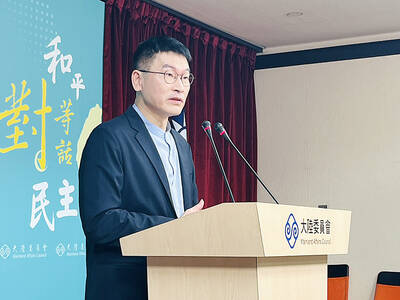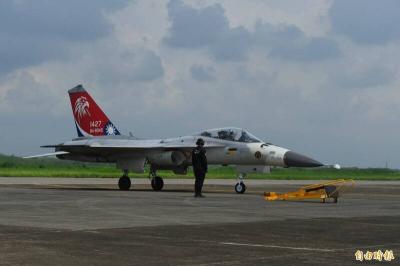China's threats to place economic sanctions on Taiwan are part of a strategy to divide and conquer, but will only be realized if Taiwan moves closer to independence, analysts say.
"This is part of a traditional united-front strategy to use the business community to surround the government and to mobilize the people to exert pressure on the independence forces," said Joseph Cheng (
China employed the strategy in reverse throughout the 1990s, offering lucrative economic incentives to Taiwanese businesses in the belief that the more investment flowed from Taiwan, the greater the possibility of reunification, he said.
Similar tactics were also widely used to smooth over Hong Kong's handover to China in 1997.
But with the re-election of President Chen Shui-bian (陳水扁) in March, China has apparently decided it must now use disincentives to attract support for reunification.
In the last week, a number of Beijing academics have been calling for economic sanctions to be put in place against Taiwanese independence forces. The government has said that investment from pro-independence businessmen is not welcome.
Wang Jianmin (王建民), a Taiwan specialist at the Chinese Academy of Social Sciences, said that if economic sanctions against Taiwan were imposed, they would involve limiting or even banning imports.
"Taiwan's overseas trade sector would be the first to suffer and see a one-third drop in its exports, then the manufacturing and production sector would be hit, causing mass shutdowns among these firms and a major economic recession," he was quoted as saying by the state-run China Daily.
When contacted by reporters, Wang refused to detail what specific legal measures Beijing could use to impose such economic sanctions, nor whether it would invoke state security laws to achieve its goal.
"It is still not clear what the mainland plans to do, but it is likely to be calibrated to the actual situation," Cheng said.
"If Chen Shui-bian moves closer toward independence, they will step up the pressure and maybe attack suspect Taiwan businessmen, but if he backs down then things will probably go on as normal," he said.
Taiwan has been a major engine of China's economic growth with over US$70 billion invested in the Chinese economy.
Indirect trade between Taiwan and China rose 23.8 percent year-on-year to US$46.32 billion last year.
After naming suspect businessmen and companies, Beijing would probably seek to influence their share prices through attacks in the media, Cheng said.
"China would also refuse to approve any investment projects on the mainland by any suspect companies," he said.
China, though, would probably avoid confiscating investment or arresting suspect Taiwanese investors under its murky state security laws, which are routinely used to jail political dissidents and suspected separatists.
"They won't use arrests or jailing under the national security laws, because that would be just too scary and the reaction in Taiwan would make such moves counter-productive," Cheng said.
China has a history of using economic sanctions in political disputes, including unannounced sanctions against French companies following the sale of Mirage fighter jets to Taiwan in the early 1990s.
In recent years, both Credit Suisse First Boston and Japan's Matsushita have been temporarily blacklisted for falling foul of Beijing's Taiwan policy.
Trading house Jardine Matheson was long out of favor with China over its support for democratic reform in Hong Kong during the lead-up to the 1997 transfer of power.

LOW RISK: Most nations do not extradite people accused of political crimes, and the UN says extradition can only happen if the act is a crime in both countries, an official said China yesterday issued wanted notices for two Taiwanese influencers, accusing them of committing “separatist acts” by criticizing Beijing, amid broadening concerns over China’s state-directed transnational repression. The Quanzhou Public Security Bureau in a notice posted online said police are offering a reward of up to 25,000 yuan (US$3,523) for information that could contribute to the investigation or apprehension of pro-Taiwanese independence YouTuber Wen Tzu-yu (溫子渝),who is known as Pa Chiung (八炯) online, and rapper Chen Po-yuan (陳柏源). Wen and Chen are suspected of spreading content that supported secession from China, slandered Chinese policies that benefit Taiwanese and discrimination against Chinese spouses of

ALIGNED THINKING: Taiwan and Japan have a mutual interest in trade, culture and engineering, and can work together for stability, Cho Jung-tai said Taiwan and Japan are two like-minded countries willing to work together to form a “safety barrier” in the Indo-Pacific region, Premier Cho Jung-tai (卓榮泰) yesterday said at the opening ceremony of the 35th Taiwan-Japan Modern Engineering and Technology Symposium in Taipei. Taiwan and Japan are close geographically and closer emotionally, he added. Citing the overflowing of a barrier lake in the Mataian River (馬太鞍溪) in September, Cho said the submersible water level sensors given by Japan during the disaster helped Taiwan monitor the lake’s water levels more accurately. Japan also provided a lot of vaccines early in the outbreak of the COVID-19 pandemic,

PROMOTION: Travelers who want a free stopover must book their flights with designated travel agents, such as Lion Travel, Holiday Tours, Cola Tour and Life Tours Air Canada yesterday said it is offering Taiwanese travelers who are headed to North America free stopovers if they transit though airports in Japan and South Korea. The promotion was launched in response to a potential rise in demand for flights to North America in June and July next year, when the US, Canada and Mexico are scheduled to jointly host the FIFA World Cup, Air Canada said. Air Canada offers services to 13 of the 16 host cities of the tournament’s soccer games, including Toronto and Vancouver; Mexico City, Guadalajara and Monterrey in Mexico; Atlanta, Georgia; Boston; Dallas; Houston;

The US approved the possible sale to Taiwan of fighter jet spare and repair parts for US$330 million, the Pentagon said late yesterday, marking the first such potential transaction since US President Donald Trump took office in January. "The proposed sale will improve the recipient's capability to meet current and future threats by maintaining the operational readiness of the recipient's fleet of F-16, C-130," and other aircraft, the Pentagon said in a statement. Trump previously said that Chinese President Xi Jinping (習近平) has told him he would not invade Taiwan while the Republican leader is in office. The announcement of the possible arms